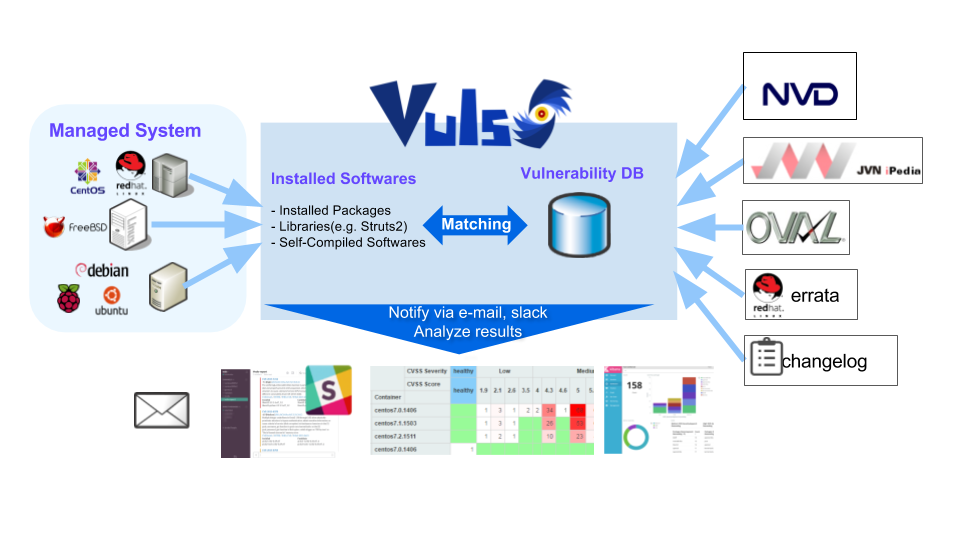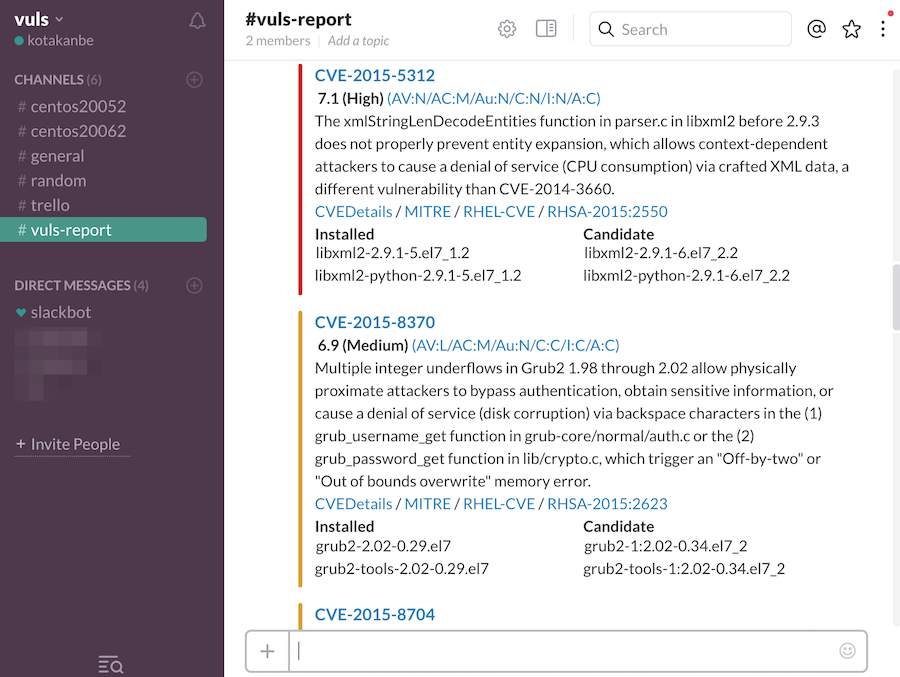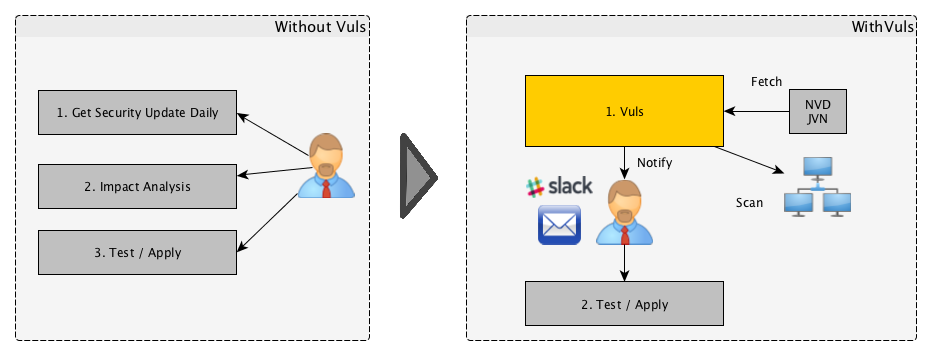* Change config.toml, Auto-generate UUIDs, change structure of optional field * Detect processes affected by update using yum-ps (#482) Detect processes affected by update using yum-ps * Detect processes needs restart using checkrestart on Debian and Ubuntu. * pass cpename by args when calling FillCveInfo (#513) * fix new db (#502) * Include Version,Revision in JSON * Include hostname in JSON * Update goval-dictionary's commit hash in Gopkg.lock * Remove README.ja.md * update packages (#596) * fix: change ControlPath to .vuls of SSH option (#618) * feat: checkrestart for Ubuntu and Debian (#622) * feat: checkrestart for Ubuntu and Debian * fix: dependencies check logic of configtest * feat: need-restarting on RedHat * refactor: Process.ProcName to Process.Name * feat: detect a systemd service name of need-restarting-process * feat: detect a systemd service name of need-restarting-process on Ubuntu * feat: fill a service name of need-restarting-process, init-system * Support NVD JSON and CVSS3 of JVN (#605) * fix: compile errors * fix: Show CVSS3 on TUI * fix: test cases * fix: Avoid null in JSON * Fix maxCvssScore (#621) * Fix maxCvssScore * Update vulninfos.go * fix(init): remove unnecessary log initialization * refactor(nvd): use only json feed if exists json data. if not, use xml feed * fix(scan): make Confidence slice * feat(CWE): Display CWE name to TUI * feat(cwe): import CWE defs in Japanese * feat(cwe): add OWASP Top 10 ranking to CWE if applicable * feat(scan): add -fast-root mode, implement scan/amazon.go * refactor(const): change const name JVN to Jvn * feat(scan): add -fast-root mode, implement scan/centos.go * refactor(dep): update deps * fix(amazon): deps check * feat(scan): add -fast-root mode, implement scan/rhel.go * feat(scan): add -fast-root mode, implement scan/oracle.go * fix complile err * feat(scan): add -fast-root mode, implement scan/debian.go * fix testcase * fix(amazon): scan using yum * fix(configtest): change error message, status when no scannnable servers * Fix(scan): detect init process logic * fix(tui): display cvss as table format * fix(scan): parse a output of reboot-notifier on CentOS6.9 * fix(tui): don't display score, vector when score is zero * fix(scan): add -offline mode to suse scanner * fix(scan): fix help message * feat(scan): enable to define scan mode for each servers in config.toml #510 * refactor(config): chagne cpeNames to cpeURIs * refactor(config): change dependencyCheckXMLPath to owaspDCXMLPath * fix(config): containers -> containersIncluded, Excluded, containerType * feature(report): enable to define cpeURIs for each contaner * feature(report): enable to specify owasp dc xml path for each container * fix(discover): fix a template displayed at the end of discover * feature(report): add ignorePkgsRegexp #665 * feature(report): enable to define ignoreCves for each container #666 * fix(report): Displayed nothing in TUI detail area when CweID is nil * Gopkg.toml diet * feat(server): support server mode (#678) * feat(server): support server mode * Lock go version * Use the latest kernel release among the installed release when the running kernel release is unknown * Add TestViaHTTP * Set logger to go-cve-dictionary client * Add -to-localfile * Add -to-http option to report * Load -to-http conf from config.toml * Support gost (#676) * feat(gost): Support RedHat API * feat(gost): Support Debian Security Tracker * feat(db): display error msg when SQLite3 is locked at the beginning of reporting. * feat(gost): TUI * Only use RedHat information of installed packages * feat(tui): show mitigation on TUI * feat(gost): support redis backend * fix test case * fix nil pointer when db is nil * fix(gost): detect vulns of src packages for Debian * feat(gost): implement redis backend for gost redhat api * feat(report): display fixState of unfixed pkgs * fix(report): display distincted cweIDs * feat(slack): display gost info * feat(slack): display mitigation * feat(report): display available patch state as fixed/total * fix(tui): display - if source of reference is empty * update deps * fix(report): key in ScanResult JSON be lowerCamelcase. * some keys to lower camel * fix(configtest): dep check logic of yum-plugin-ps * fix(tui): format * feat(report): add -format-list option * fix(report): -format-full-text * fix(report): report -format-full-text * fix(report): display v3 score detected by gost * fix(scan): scan in fast mode if not defined in config.toml * fix(gost): fetch RedHat data for fixed CVEs * feat(report): show number of cves detected in each database * fix(report): show new version as `Unknown` in offline and fast scan mode * fix(report): fix num of upadtable and fixed * fix(report): set `Not fixed yet` if packageStatus is empty * refact(gost): make convertToModel public * fix(test): fix test case * update deps * fix(report): include gost score in MaxCvssScore * [WIP] feat(config): enable to set options in config.toml instead of cmd opt (#690) * feat(config): enable to set options in config.toml instead of cmd opt * fix(config): change Conf.Report.Slack to Conf.Slack * fix(discover): change tempalte * fix(report): fix config.toml auto-generate with -uuid * Add endpoint for health check and change endpoint * refact(cmd): refactor flag set * fix(report): enable to specify opts with cmd arg and env value * fix(scan): enable to parse the release version of amazon linux 2 * add(report) add -to-saas option (#695) * add(report) add -to-saas option * ignore other writer if -to-saas * fix(saas) fix bug * fix(scan): need-restarting needs internet connection * fix(scan,configtest): check scan mode * refactor(scan): change func name * fix(suse): support offline mode, bug fix on AWS, zypper --no-color * fix(tui): fix nil pointer when no vulns in tui * feat(report): enable to define CPE FS format in config.toml * fix(vet): fix warnings of go vet * fix(travis): go version to 1.11 * update deps
Vuls: VULnerability Scanner
Vulnerability scanner for Linux/FreeBSD, agentless, written in golang.
We have a slack team. Join slack team
Twitter: @vuls_en
Abstract
For a system administrator, having to perform security vulnerability analysis and software update on a daily basis can be a burden. To avoid downtime in production environment, it is common for system administrator to choose not to use the automatic update option provided by package manager and to perform update manually. This leads to the following problems.
- System administrator will have to constantly watch out for any new vulnerabilities in NVD(National Vulnerability Database) or similar databases.
- It might be impossible for the system administrator to monitor all the software if there are a large number of software installed in server.
- It is expensive to perform analysis to determine the servers affected by new vulnerabilities. The possibility of overlooking a server or two during analysis is there.
Vuls is a tool created to solve the problems listed above. It has the following characteristics.
- Informs users of the vulnerabilities that are related to the system.
- Informs users of the servers that are affected.
- Vulnerability detection is done automatically to prevent any oversight.
- Report is generated on regular basis using CRON or other methods. to manage vulnerability.
Main Features
- Scan for any vulnerabilities in Linux/FreeBSD Server
- Supports Alpine, Ubuntu, Debian, CentOS, Amazon Linux, RHEL, Oracle Linux, SUSE Enterprise Linux and Raspbian, FreeBSD
- Cloud, on-premise, Docker
- High quality scan
- Vuls uses Multiple vulnerability databases
- NVD
- JVN(Japanese)
- RedHat
- Debian
- Ubuntu
- SUSE
- Oracle Linux
- Alpine-secdb
- RHSA/ALAS/ELSA/FreeBSD-SA
- Changelog
- Vuls uses Multiple vulnerability databases
- Fast scan and Deep scan
- Fast Scan
- Scan without root privilege
- Scan with No internet access. (RedHat, CentOS, OracleLinux, Ubuntu and Debian)
- Almost no load on the scan target server
- Deep Scan
- Scan with root privilege
- Detect processes affected by update using yum-ps (RedHat, CentOS, OracleLinux and Amazon Linux)
- Parses the Changelog
Changelog has a history of version changes. When a security issue is fixed, the relevant CVE ID is listed. By parsing the changelog and analysing the updates between the installed version of software on the server and the newest version of that software it's possible to create a list of all vulnerabilities that need to be fixed. - Sometimes load on the scan target server
- Fast Scan
- Remote scan and Local scan
- Remote Scan
- User is required to only setup one machine that is connected to other target servers via SSH
- Local Scan
- If you don't want the central Vuls server to connect to each server by SSH, you can use Vuls in the Local Scan mode.
- Remote Scan
- Dynamic Analysis
- It is possible to acquire the state of the server by connecting via SSH and executing the command
- Vuls warns when the scan target server was updated the kernel etc. but not restarting it.
- It is possible to acquire the state of the server by connecting via SSH and executing the command
- Scan middleware that are not included in OS package management
- Scan middleware, programming language libraries and framework for vulnerability
- Support software registered in CPE
- Nondestructive testing
- Pre-authorization is NOT necessary before scanning on AWS
- Vuls works well with Continuous Integration since tests can be run every day. This allows you to find vulnerabilities very quickly.
- Auto generation of configuration file template
- Auto detection of servers set using CIDR, generate configuration file template
- Email and Slack notification is possible (supports Japanese language)
- Scan result is viewable on accessory software, TUI Viewer on terminal or Web UI (VulsRepo).
What Vuls Doesn't Do
- Vuls doesn't update the vulnerable packages.
Document
For more information such as Installation, Tutorial, Usage, visit vuls.io
日本語翻訳ドキュメント
Authors
kotakanbe (@kotakanbe) created vuls and these fine people have contributed.
Change Log
Please see CHANGELOG.
Stargazers over time
License
Please see LICENSE.







